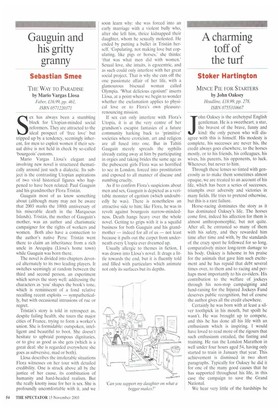Gauguin and his gritty granny
Sebastian Smee
THE WAY TO PARADISE by Mario Vargas Llosa Faber, £16.99, pp. 461, ISBN 0571220371 Sex has always been a stumbling block for Utopian-minded social reformers. They are attracted to the ideal prospect of 'free love' but tripped up by a tendency, seemingly inherent, for men to exploit women if their sexual drive is not held in check by so-called 'bourgeois' customs.
Mario Vargas Llosa's elegant and involving new novel is structured thematically around just such a dialectic. Its subject is the contrasting Utopian aspirations of two vivid historical figures who happened to have been related: Paul Gauguin and his grandmother Flora Tristan.
Gauguin most of us know something about (although many may not be aware that 2003 marks the 100th anniversary of his miserable death in the Marquesas Islands), Tristan, the mother of Gauguin's mother, was an author and charismatic campaigner for the rights of workers and women. Both also have a connection to the author's native Peru: Tristan went there to claim an inheritance from a rich uncle in Arequipa (Llosa's home town) while Gauguin was born there.
The novel is divided into chapters devoted alternately to its two leading players. It switches seemingly at random between the third and second person, an experiment which serves the story well: addressing the characters as 'you' shapes the book's tone, which is reminiscent of a fond relative recalling recent exploits — sympathetically, but with occasional intrusions of rue or regret.
Tristan's story is told in retrospect as, despite failing health, she tours the major cities of France, trying to form a worker's union. She is formidable: outspoken, intelligent and beautiful to boot. She doesn't hesitate to upbraid pompous dignitaries, or to give as good as she gets (which is a great deal: she is regarded everywhere she goes as subversive, mad or both).
Llosa describes the intolerable situations Flora witnesses on her tour with detailed credibility. One is struck above all by the justice of her cause, its combination of humanity and hard-headed realism. But the really knotty issue for her is sex. She is profoundly uncomfortable with it, and we soon learn why: she was forced into an early marriage with a violent bully who, after she left him, thrice kidnapped their daughter, whom he sexually molested. He ended by putting a bullet in Tristan herself. 'Copulating, not making love but copulating, like pigs or horses,' she thinks: that was what men did with women.' Sexual love, she intuits, is egocentric, and as such could only interfere with her great social project. That is why she cuts off the one passionate affair of her life, with a glamourous bisexual woman called Olympia. What delicious egotism!' inserts Llosa, at a point where we begin to wonder whether the exclamation applies to physical love or to Flora's own pleasurerenouncing mission.
If sex can only interfere with Flora's Utopia, it is at the very centre of her grandson's escapist fantasies of a future community harking back to 'primitive' societies where eroticism, art and religion are all fused into one. But in Tahiti Gauguin merely spreads the syphilis already eating away at him by participating in orgies and taking brides the same age as the pubescent girls Flora was so horrified to see in London, forced into prostitution and exposed to all manner of disease and numbing cruelty.
As if to confirm Flora's suspicions about men and sex, Gauguin is depicted as a veritable monster of egotism (which undoubtedly he was). There is nonetheless an attractive side to him; like Flora, he was in revolt against bourgeois narrow-mindedness. Death hangs heavy over the whole novel. Getting to grips with it is a squalid business for both Gauguin and his grandmother — indeed for all of us — not least because it pulls out the carpet from underneath every Utopia ever dreamed up.
Usually allergic to themes in fiction, I was drawn into Llosa's novel. It drags a little towards the end, but it is fluently told and filled with particulars which animate not only its surfaces but its depths.


























































































 Previous page
Previous page